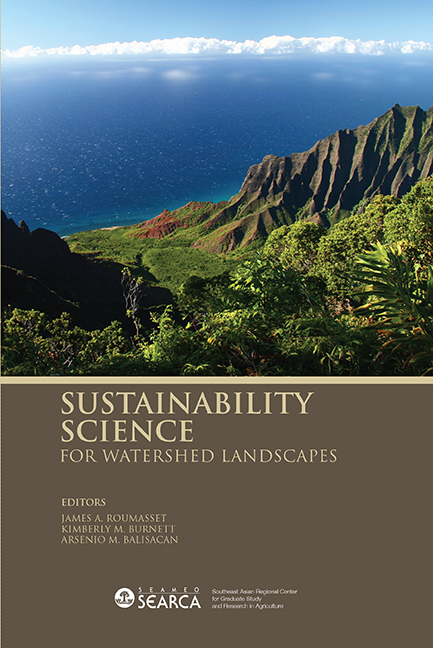Book contents
- Frontmatter
- Contents
- Tables
- Figures
- Message
- Foreword
- Preface
- Acknowledgments
- List of Contributors
- Theme 1 Sustainability Science for Resource Management and Policy
- 1 Economic Policy for Sustainable Development vs. Greedy Growth and Preservationism
- 2 Integrated Watershed Management: Trees, Aquifers, Reefs, and Mud
- 3 Transdisciplinary Research in Watershed Conservation: Experiences, Lessons, and Future Directions
- 4 Payments for Ecological Services: Experiences in Carbon and Water Payments in the Philippines
- Theme 2 Monitoring and Modelling
- Theme 3 Participatory Approaches
- Theme 4 Case Studies
- Synthesis
4 - Payments for Ecological Services: Experiences in Carbon and Water Payments in the Philippines
from Theme 1 - Sustainability Science for Resource Management and Policy
Published online by Cambridge University Press: 21 October 2015
- Frontmatter
- Contents
- Tables
- Figures
- Message
- Foreword
- Preface
- Acknowledgments
- List of Contributors
- Theme 1 Sustainability Science for Resource Management and Policy
- 1 Economic Policy for Sustainable Development vs. Greedy Growth and Preservationism
- 2 Integrated Watershed Management: Trees, Aquifers, Reefs, and Mud
- 3 Transdisciplinary Research in Watershed Conservation: Experiences, Lessons, and Future Directions
- 4 Payments for Ecological Services: Experiences in Carbon and Water Payments in the Philippines
- Theme 2 Monitoring and Modelling
- Theme 3 Participatory Approaches
- Theme 4 Case Studies
- Synthesis
Summary
ABSTRACT
There is a rising interest globally in payments for ecological services (PES) as a way of promoting sustainable development. In this paper, we share the experience of the Philippines in payments for carbon storage and watershed protection. There are several projects on carbon sequestration in varying stages of design and implementation, most of which are in the planning stage. The initial lessons regard the country's potential for carbon sequestration projects, the insufficiency of carbon payments to cover the full cost of plantation development, and the high transaction cost that have limited the participation of local residents. Payments for watershed protection were more advanced. Several projects, meanwhile, are ongoing. The value of water was more easily recognised at the local and national levels. However, most of the payments did not satisfy the requirements for full-fledged PES.
INTRODUCTION
There is a lot of interest in PES schemes around the world (Landell-Mills and Porras 2002). An environmental service payment or reward refers to compensation for service, merit or effort, and/or incentives for maintaining or enhancing environmental service functions received by the sellers or paid for by the buyers of the environmental service(s) (van Noordwijk 2005). It is a voluntary transaction in which a well-defined environmental service or a land use likely to secure that service) is “bought” by a (minimum of one) buyer from a (minimum of one) provider if and only if the provider continuously secures the provision of the service (conditionality) (Wunder 2005).
The compensation and incentives can be financial, social and moral. Compensation may be made in terms of direct payments, financial incentives, or payments in kind. The rewards and payments in kind may include the provision of infrastructure, market preference, planting materials, health and educational services, skills training, technical assistance, or other material benefits. Aside from indirect and direct monetary payments, rewards can take the form of land tenure security, which may also be considered an economic incentive. Social and moral incentives and rewards may address the non-material aspects of poverty, including the recognition and respect of the community, and personal satisfaction.
- Type
- Chapter
- Information
- Sustainability Science for Watershed Landscapes , pp. 103 - 124Publisher: ISEAS–Yusof Ishak InstitutePrint publication year: 2010



